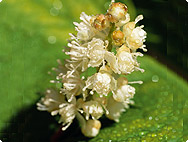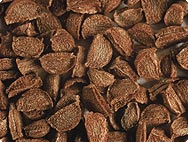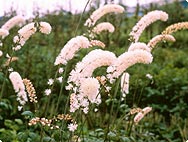A.Vogel search
When the internal search is activated, personal data such as your IP address is transmitted to our search engine Cludo. Data is thus transferred to a third country. Please click here if you want to display the internal search. You can find more information on data protection here: Privacy policy.
Cimicifuga racemosa (L.) Nut
Black Cohosh
History

The Latin name Cimicifuga derives from cimex, which means ’bug‘, and fugo, which means ’flight ‘ and is derived from fugáre, ’to put to flight‘. This name and the common English name ’bugbane‘ refer to the repellent smell of the inflorescences, which serves to drive away aphids. The species name racemosa means ’grapelike’. The Cimicifuga root is an old remedy of the native tribes of Canada, Wisconsin and Missouri. They used it to treat snakebite and to ease childbirth, giving rise to the common names ’snakeroot‘ and ’squawroot’. In the 19th century, Black Cohosh was considered a miracle cure in the treatment of tuberculosis, feverish rheumatism and chorea (St Vitus' dance). It was soon forgotten by conventional medicine. Verification of its homoeopathic profile as a remedy led to its reputation as an important medication for women’s problems.
Botanical characteristics

The up to 2 metre high herbaceous plant develops from a stout cylindrical rhizome. The plant has large, long-stemmed, tripinnate and coarsely serrate leaves. The inflorescence forms a long, slender, complex cluster with white, unpleasant-smelling, four-petalled blossoms. The approximately 5mm long, thickly oval, leathery pods with numerous brown, flat seeds develop in the autumn. Cimicifuga flowers in July.
Habitat

Blach Cohosh is native to the eastern part of the North American continent and thrives in moist or dry locations in sparse forests, hedges and forest clearings. Native European relations are Actaea spicata, ‘Herb Christopher’ and only in Europe, Cimicifuga europaea, ‘Stinking Bug herb’.
Preparation
A.Vogel/Bioforce uses the mother tincture, which is produced from the fresh rootstock and its accompanying roots that are dug up from the wild in the autumn. The homoeopathic dilution is produced by manual shaking.
A.Vogel Blog – Natural and Healthy
Inspiration for a healthy life!



